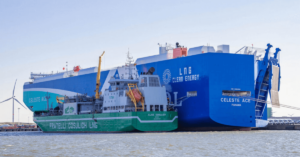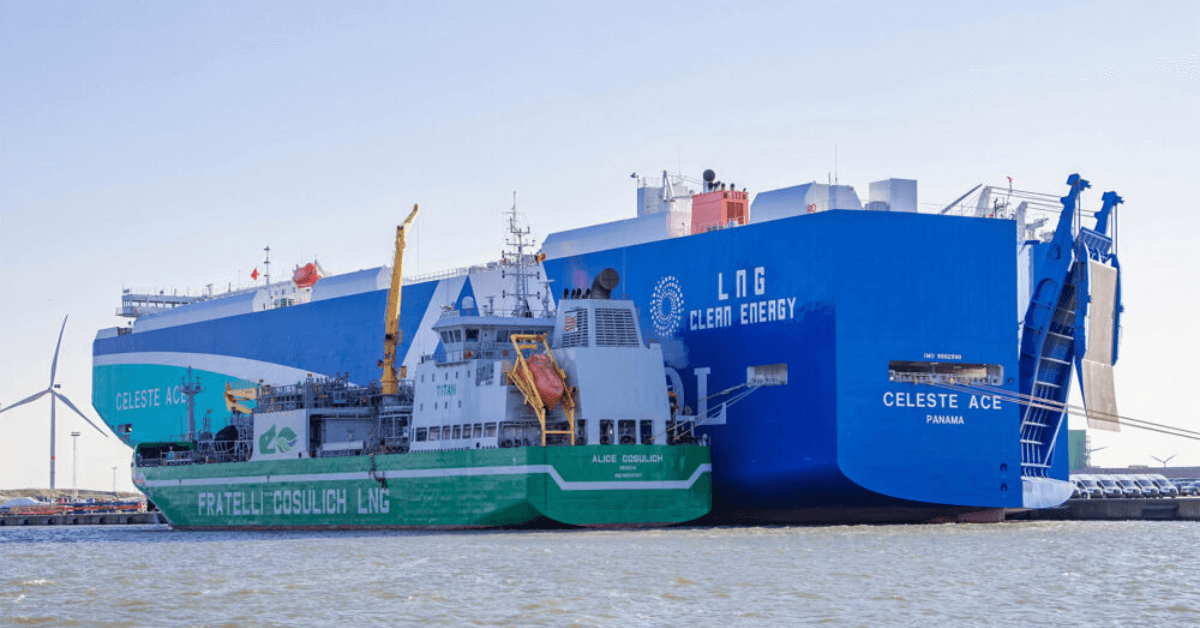
US Strikes Houthis For Third Consecutive Day To Protect Red Sea Shipping
March 18, 2025
Cruise Ship Passenger Arrested For Smuggling 10kg Of Cocaine Into Sydney
March 18, 2025

Titan Clean Fuels and MOL have conducted the first LNG and bio-LNG bunkering operation under a new multi-delivery contract for MOL’s vehicle carrier fleet.
The operation took place on March 16 at the Port of Zeebrugge’s International Car Operators (ICO) terminal. Titan’s Alice Cosulich LNG bunkering vessel supplied 500 tons of bio-LNG and 400 tons of conventional LNG to MOL’s Celeste Ace vehicle carrier.
The simultaneous operation (SIMOPS) ensured a smooth and efficient bunkering process.
The bio-LNG delivered by Titan is ISCC-EU certified and produced from waste and residue, making it a sustainable alternative to conventional fuels. According to Titan, this fuel can reduce greenhouse gas (GHG) emissions by up to 100% compared to marine diesel on a well-to-wake basis.
The main advantage of bio-LNG is its compatibility with existing LNG infrastructure. It can be blended with conventional LNG or renewable hydrogen-derived e-methane and used in current bunkering systems without requiring major modifications.
A senior representative from Titan said that MOL’s commitment to using LNG and bio-LNG is reinforcing the industry’s shift toward sustainable shipping.
The official stated that this collaboration strengthens their regional presence and ensures a steady supply of lower-carbon fuel solutions for MOL’s fleet.
Another Titan official stated that the demand for bio-LNG is increasing as shipowners and operators look for practical ways to reduce their carbon footprint.
The company believes that as bio-LNG production scales up, its cost-effectiveness and deep decarbonisation potential will make it an essential part of the clean energy transition in shipping.
A representative from MOL’s Marine Fuel GX Division confirmed that the company is exploring ammonia and hydrogen fuels while continuing to expand its LNG-fueled fleet.
The official said that MOL intends to be an early adopter of bio-LNG and synthetic LNG. MOL has committed to achieving net-zero GHG emissions by 2050, and expanding the use of bio-LNG.
The adoption of LNG and bio-LNG as marine fuels is growing rapidly. Currently, MOL operates five LNG-fueled vehicle carriers, with six more set to be delivered by mid 2025.
Across the shipping industry, there are 62 LNG powered vehicle carriers in service, while another 146 are on order. Notably, 90% of new vehicle carrier orders feature LNG dual-fuel propulsion.
Reference: Titan
Source: Maritime Shipping News


